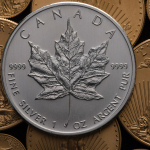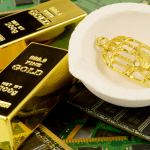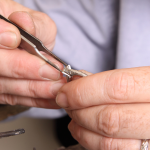You may not be 100% sure what palladium is, but chances are that you have it around you, from your cell phone to your car, you are definitely interacting with a variety of objects containing palladium day by day. Interestingly, over half of the supply of palladium (and part of the platinum available) goes into manufacturing catalytic converters, which convert up to 90% of harmful gases from auto exhaust into less harmful substances. So what is palladium? And if it is a precious metal, what’s it doing in auto supplies?
Palladium is a rare and lustrous silvery-white metal discovered in 1803 by William Hyde Wollaston, who named if after the asteroid Pallas. Palladium, along with platinum, rhodium ruthenium, iridium, and osmium are all referred to as the “platinum group metals” (PGMs). These “platinum group metals” have some chemical properties in common, but palladium has the lowest melting point and is the least dense of these precious metals.
It’s those qualities: its beautiful lustrous whiteness combined with its lower melting point and malleability that make palladium one of the most popular metals used in making white gold alloys. Palladium-gold is more expensive than nickel-gold, but there is far less risk of allergic reactions with palladium-gold than with other mixtures. The lower risk of allergic reactions is also what makes it ideal for dental work when a white-gold is desired.
Deposits of palladium are rare, but it is found in South Africa and a mine complex in Montana, as well as locations in Ontario, Canada and Russia. However, a lot of this metal is simply recycled back into the system from scrapped catalytic converters.
Because of the relative scarcity, palladium’s price is very much market driven with an interesting story or two in its history. For instance, in the run up to the year 2000, the palladium supply coming from Russia was disrupted. The disruption was so powerful that the price was driven to an all-time high of $1,100 per ounce in 2001. Among the worried buyers was the Ford Motor Company, which was concerned about a shortage and hoarded large amounts of the metal purchased near the market’s peak. The supply opened up in early 2001 and Ford lost money as a result of its exuberant purchasing.
For our purposes, we’re happy to receive and remelt dental palladium, gold or platinum at our Manhattan location and return the value of those metals based on the London Daily Fixing. We can also assist in the recycling of most unwanted palladium-containing equipment. We’ve been serving customers since 1985. Contact us and let us know how we can help you.









